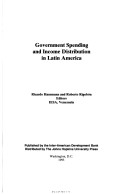Caught between declining revenues and increasing demands for social spending, the countries of Latin America have faced serious fiscal imbalances in the 1980s and 1990s. While macroeconomic and efficiency considerations have guided most attempts to control these deficits, this book looks at how public resources are distributed. It identifies the distributional impact of several key vehicles for resource transfers, including tax systems, public health care, education, pension funds, price controls and subsidies to the productive sectors. Country studies of Chile, the Dominican Republic, Peru and Venezuela focus particular attention on the deterioration of income distribution over the past two decades and its effect on inflation and unemployment. The studies classify distribution programmes based on the proportion of per capita transfers directed to low-income groups. A summary chapter compares the country studies and recommends programme designs and shifts in spending priorities that could improve government efficiency and achieve greater distributive equity throughout the region.
- ISBN10 0940602652
- ISBN13 9780940602656
- Publish Date January 1994
- Publish Status Out of Print
- Out of Print 10 January 2001
- Publish Country US
- Publisher Johns Hopkins University Press
- Imprint The Johns Hopkins University Press / The Inter-American Development Bank
- Format Paperback
- Pages 240
- Language English
